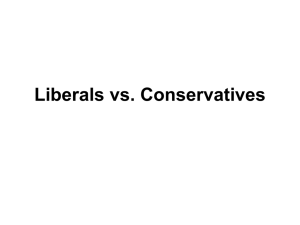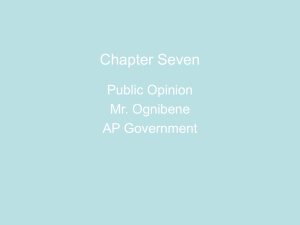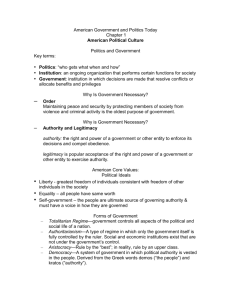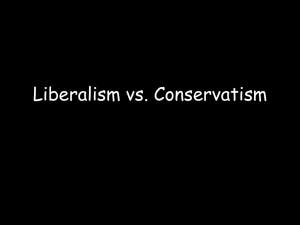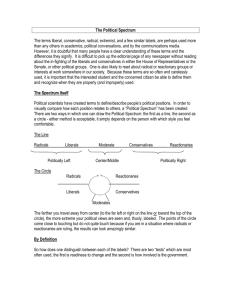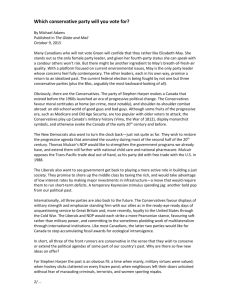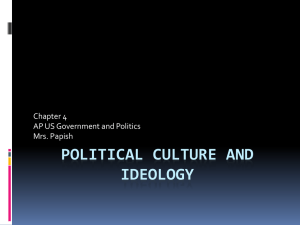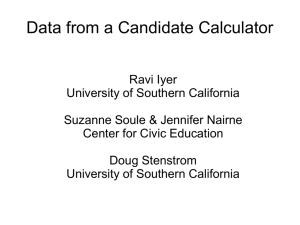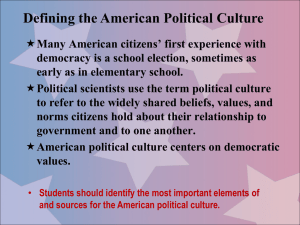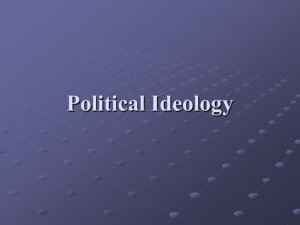ap american government chapter four
advertisement
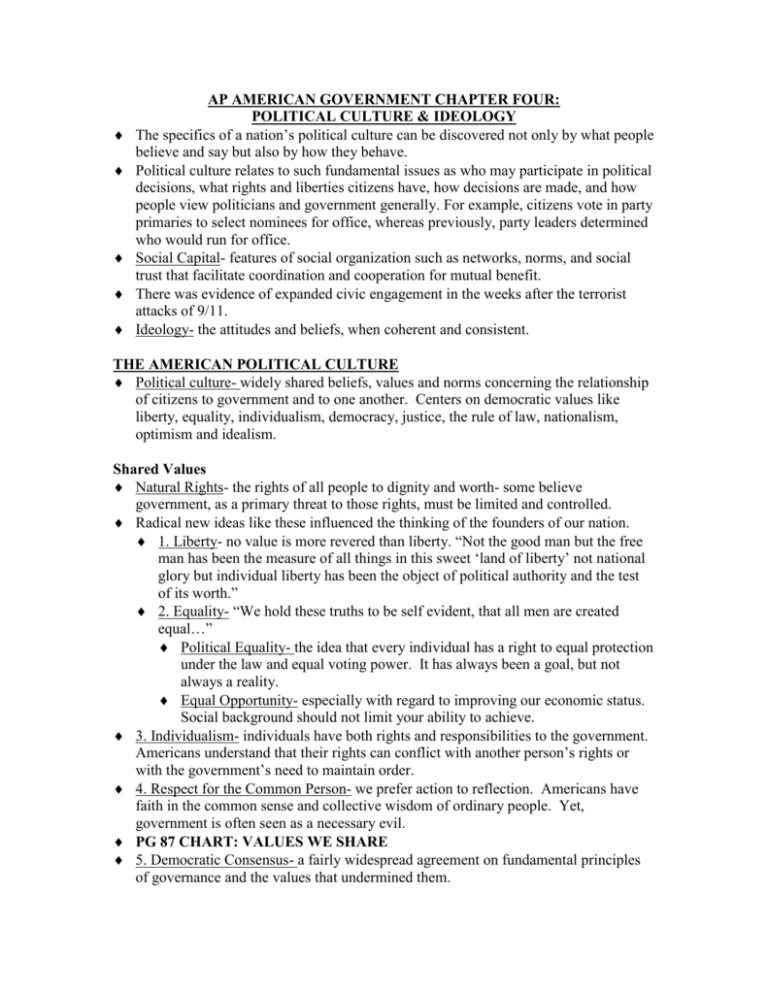
AP AMERICAN GOVERNMENT CHAPTER FOUR: POLITICAL CULTURE & IDEOLOGY The specifics of a nation‟s political culture can be discovered not only by what people believe and say but also by how they behave. Political culture relates to such fundamental issues as who may participate in political decisions, what rights and liberties citizens have, how decisions are made, and how people view politicians and government generally. For example, citizens vote in party primaries to select nominees for office, whereas previously, party leaders determined who would run for office. Social Capital- features of social organization such as networks, norms, and social trust that facilitate coordination and cooperation for mutual benefit. There was evidence of expanded civic engagement in the weeks after the terrorist attacks of 9/11. Ideology- the attitudes and beliefs, when coherent and consistent. THE AMERICAN POLITICAL CULTURE Political culture- widely shared beliefs, values and norms concerning the relationship of citizens to government and to one another. Centers on democratic values like liberty, equality, individualism, democracy, justice, the rule of law, nationalism, optimism and idealism. Shared Values Natural Rights- the rights of all people to dignity and worth- some believe government, as a primary threat to those rights, must be limited and controlled. Radical new ideas like these influenced the thinking of the founders of our nation. 1. Liberty- no value is more revered than liberty. “Not the good man but the free man has been the measure of all things in this sweet „land of liberty‟ not national glory but individual liberty has been the object of political authority and the test of its worth.” 2. Equality- “We hold these truths to be self evident, that all men are created equal…” Political Equality- the idea that every individual has a right to equal protection under the law and equal voting power. It has always been a goal, but not always a reality. Equal Opportunity- especially with regard to improving our economic status. Social background should not limit your ability to achieve. 3. Individualism- individuals have both rights and responsibilities to the government. Americans understand that their rights can conflict with another person‟s rights or with the government‟s need to maintain order. 4. Respect for the Common Person- we prefer action to reflection. Americans have faith in the common sense and collective wisdom of ordinary people. Yet, government is often seen as a necessary evil. PG 87 CHART: VALUES WE SHARE 5. Democratic Consensus- a fairly widespread agreement on fundamental principles of governance and the values that undermined them. Majority Rule- governance according to the expressed preferences of the majority at regular elections. Popular Sovereignty- the ultimate power resides in the people. Government, from this perspective, exists to serve the people rather than the other way around. People exercise the power through elections. Limits on government are specified in the Constitution- many of the rights are more in the abstract than in the particular. PG. 88: TABLE: WHAT DO YOU MEAN BY RIGHTS & FREEDOMS 6. Justice & The Rule of Law- The rule of law means that government is based on a body of law applied equally and just procedures, as opposed to rule by an elite whose whims decide policy or resolve disputes. For government to adhere to the rule of law, its policies and laws should follow these 5 rules: 1. Generality- laws should be stated generally, not singling out any group or individual. 2. Prospectivety- laws should apply to the future, not punish something someone did in the past. 3. Publicity- laws cannot be kept secret and then enforced. 4. Authority- valid laws are made by those with legitimate power, and the people legitimate that power through some form of popular consent. 5. Due process- laws must be enforced impartially with fair processes. 7. Nationalism, Optimism and Idealism- Americans are highly nationalistic, sharing a sense of values and identity. U.S. citizens are more satisfied with the democratic government than citizens of other countries. (PG. 90- WHY IS THIS- is ours necessarily BETTER??) The American Dream American Dream- a complex set of ideas holding that the US is a land of opportunity and that individual initiative and hard work can bring about economic success. Capitalism- economic system characterized by private property, competitive markets, economic incentives, and limited government involvement in the production and pricing of goods and services. U.S. is the land of opportunity for the enterprising- we assume that people who have more ability or who work extremely hard will get ahead, earn more, and enjoy economic rewards. Corporations gain great wealth, and with it, exercise political clout. Competitive Economy- one where individuals reap large rewards for their initiative and hard work Egalitarian Society- where everyone earns a decent living, in constant conflict with competitive economy. As important as the American Dream is to the national consciousness, Americans know it remains unfulfilled. Political & Economic Change Political values are clearly affected by historical developments and by economic and technological growth. Notions of political equality and effective participation emerged during the presidency of Andrew Jackson. I. THE INDUSTRIAL TRANSFORMATION: Large privately owned corporations changed the economic order, including changes in the role of government and how people viewed each other. One consequence was a high degree of inequality in the distribution of wealth and income…citizens, it was argued, must enjoy a rough equality of conditions. Disparities of income grew, so did disparities in political resources. Economic resources can be converted into political resources. Monopolies- domination of an industry by a single company who fixes prices and discourages competition- also uses that dominance to exploit workers and limit competition. Antitrust Legislation- federal laws that try to prevent monopolies from dominating an industry and restraining trade Idea grew that the national government could – and should- “promote the general welfare” by regulating working conditions, product safety, and labor-management disputes. II. THE GREAT DEPRESSION & THE NEW DEAL Unrestrained capitalism and an unregulated market were faulted as causes of the Depression. Roosevelt‟s New Deal- idea that governments, both state and national, should use their powers and resources to ensure some measure of equal opportunity and social justice. Roosevelt‟s State of the Union Address in 1944 “Second Bill of Rights” The right to a useful and remunerative job in the industries, shops, farms, or mines of the nation. The right to earn enough to provide adequate food and clothing and recreation. The right of every farmer to raise and sell his products at a return that would give him and his family a decent living. The right of every businessman, large and small, to trade in an atmosphere of freedom from unfair competition and domination by monopolies at home or abroad. The right of every family to a decent home. The right to adequate medical care and the opportunity to achieve and enjoy good health. The right to adequate protection from the economic fears of old age, sickness, accident and unemployment. The right to a good education. Roosevelt‟s policies and later efforts by JFK worked to pass civil rights and voting rights legislation Today, free enterprise is no longer unbridled. Government regulations, antitrust laws, job safety regulations, environmental standards, minimum wage laws all balance freedom of enterprise against the rights of the individual. POLITICAL IDEOLOGY AND ATTITUDES TOWARD GOVERNMENT Political Ideology- refers to a consistent pattern of ideas or beliefs about political values and the role of government. It includes the views people have about how government should work and how it actually works. Ideology links our basic values to the day-to-day operations or politics of government. Liberalism In 17th and 18th Centuries, classical liberals fought to minimize the role of government. They stressed individual rights and perceived government as the primary threat to rights and liberties. Favored limited government, but over time, the emphasis on individualism remained constant, but the perception of the need for government changed. Contemporary Liberals Liberalism- a belief in the positive uses of government to bring about justice and equality of opportunity. Modern day liberals wish to preserve the rights of the individual and the right to own private property, yet they are willing to have the government intervene in the economy to remedy the defects of capitalism. Advocate equal access to health care, housing, education for all citizens. Believe in the probability of progress, and are willing to trust government programs. Modern technology and industrialization cry out for government programs to offset the loss of liberties suffered by the poor and the weak. Stress the need for an involved and affirmative government. Key leaders: Edward Kennedy, Hilary Rodham Clinton, Jesse Jackson, Paul Wellstone. Liberals prefer that government take care of the weak, for the strong can always take care of themselves. Equality of opportunity is viewed by liberals as essential- rather than placing a cap on wealth, they want a floor placed beneath the poor. MORE INFO: www.prospect.org or www.turnleft.com/liberal.html Criticisms of Liberalism: Liberals place too much reliance on governmental solutions, higher taxes, and bureaucracy. Argue that liberals forgot that government, to serve our best interests, has to be limited. Too many governmental regulations and too much taxation tend to undermine the self-help ethic that made America great. Critics argue that welfare and regulatory state pushed by liberals will ultimately destroy individual initiative. “New Democrat”- Gore instance during election of 2000- more as a centrist, not a liberal. It‟s a movement to the center by some Democrats and the conventional wisdom that liberal or progressive approaches are in decline, and moving towards the center, you will gain more voters. The current political upheaval should be defined less as a revolt against big government, than as a rebellion against bad government- government that has proved ineffectual. Americans want a government that eases economic transitions and expands the choices available to individuals. The popularity of liberalism changes with world events- with end of cold war, people more concerned with foreign policy, after September 11th attacks, people become concerned with domestic affairs. CONSERVATISM Conservatism- a belief that limited government ensures order, competitive markets, and personal opportunity. Want to enhance individual liberty by keeping government small, especially the national government, except in the area of national defense. Take a more pessimistic view of human nature than liberals- maintain that people need strong leadership institutions, firm laws, and strict moral codes to keep their appetites under control. Believe that government needs to ensure order and that people who fail in life are in some way the architects of their own misfortune and must bear the main responsibility. Traditional Conservatives Are emphatically pro-business. Oppose higher taxes and resist all but the most necessary antitrust, trade and environmental regulations on corporations. Believe that the functions of government should be to protect the nation from foreign enemies, preserve law and order, enforce private contracts, foster competitive markets, encourage free and fair trade, and promote family values. Favor dispensing power broadly throughout the political and social systems to avoid concentration of power at the national level and having the markets, not the government, provide services. Believe that human needs can and should be taken care of by families and charities, and put their faith in the private sector. Show a preference for state and local government over national government activity when a government response is needed. MORE INFO: www.conservative digest.net and www.aei.org Social Conservatives Those conservatives who focus less on economics and more on morality and lifestyle. Favor strong governmental action to protect children from pornography and drugs, and want stringent limits on abortions. Brand of conservatism- sometimes called the “New Right” ultraconservatism, or the Radical Right- emerged in the 1980‟s. Favors the return of organized prayer in public schools and opposes policies like job quotas, busing, and tolerance of homosexuality. STRONG DESIRE TO IMPOSE SOCIAL CONTROLS Key players: Pat Robertson, Warren Rudman, Christian Coalition Some conservatives are uncomfortable with the close association between the Republican party and the Christian Right Criticisms of Conservatism Conservatives themselves urge more government when it serves their needsregulating pornography and abortion for example, but are opposed to it when it serves somebody else‟s. Place great faith in the market economy- are at odds with labor unions and form a close alliance with businesspeople. Push for deregulation. Reagan administration policy of “Trickle Down Economics”- lowering taxes- in the belief that by lowering taxes on the rich, their increased economic activity would trickle down to the poor. Democrats pointed out that reduced taxes and increased government spending, especially on defense, tripled the deficit during the 1980‟s while the conservatives/republicans were in control. Conservatives repeatedly fail to acknowledge and endorse policies that deal with racism and sexism. Liberals favor vigorous governmental programs to help the poor but oppose governmental intrusion into people‟s private lives to protect our national security, while some conservatives preach less government except when they consider it necessary to counter drugs, pornography, and other social evils. SOCIALISM Socialism- an economic and governmental system based on public ownership of the means of production and exchange. Karl Marx described it as a transitional stage of society between capitalism and communism. Most dramatic transformation in recent times: RUSSIA pg. 99 American socialists- favor a greatly expanded role for the government but argue that such a system is compatible with democracy. They would nationalize certain industries, institute a public jobs program so that all who want work would be put to work, place a much steeper tax burden on the wealthy, and drastically cut defense spending. PG. 100-101: CONSERVATIVE MANIFESTO vs. WHY I’M STILL LEFT Environmentalism Environmentalism- an intense concern with the environment and related matters. Also promotes grassroots democracy, social justice, equal opportunity, nonviolence, respect for diversity, and feminism. In the US the Green Party emphasizes such values as grassroots democracy, social injustice, equal opportunity, nonviolence, respect for diversity and feminism. Want to live in ways that respect the integrity of natural systems. Libertarianism Libertarianism- a political ideology that cherishes individual liberty and insists on sharply limited government. Some overtones of anarchism- promotes a free market economy, a noninterventionist foreign policy, and an absence of regulation in the moral and social spheres. Many followers believe that both liberals and conservatives lack consistency in their attitude toward the power of the national government. Preach opposition to almost all government programs, massive cuts in government spending and an end to the FBI and CIA and most regulatory commissions. Oppose participation in the UN and favor a defense establishment that would defend the US only if directly attacked. Oppose ALL governmental regulation including, mandatory seat belts, helmets, etc. They would repeal laws that regulate personal morality, including abortion, pornography, prostitution and elicit drugs. 2000 Libertarian Platform- committed to smaller government, limited by the constitution‟s specifications, proposed immediate and complete removal of the federal government from education ,energy, welfare, etc. TO LEARN MORE: www.lp.org A Word of Caution: Political labels have different meanings across national boundaries as well as over time. Real differences separate conservative and liberal groups, but this doesn‟t mean, however, that people who are conservative in one area are necessarily conservative in another, or that liberals always hold similar views. IDEOLOGY BOTH CAUSES EVENTS AND IS AFFECTED BY THEM Reflects at least in the short term, a view that government has an important role to play in responding to a crisis. POLITICAL IDEOLOGY & THE AMERICAN PEOPLE Ideological controversy today centers on the role of the government in improving schools, encouraging a stronger work ethic, and stopping the flow of drugs into the country. For others it is centered on whether to permit openly gay people into the military or sanction same-sex marriages and on the best ways to instill moral values, build character and encourage cohesive and lasting families. Distribution of ideology in the nation has been remarkably consistent. Conservatives outnumber liberals, but the proportion did not increase proportionately In the US few people see themselves as extremists. More people consider themselves slightly liberal or slightly conservative. Liberal wing is more powerful in the Democratic party, and the conservative wing is more powerful in the Republican party. Ideology provides a lense through which to view candidates and public policies. It helps simplify the complexities of politics, however, most Americans do not organize their political views systematically. The degree to which people have ideologically consistent attitudes and opinions varies but is often relatively low. Many citizens find it difficult to relate what happens in one policy situation to what happens in another. Policy making in this country is characterized more by coalitions of the moment than by fixed alignments that pit on e set of ideologies against another. IDEOLOGY & TOLERANCE conservatives are generally less tolerant than liberals- though they stoutly contest it. Liberals are usually more tolerant of dissent from some quarters and the expression of some unorthodox opinions. They exhibit somewhat greater concern then conservatives for the rights of the accused and are more willing to expand the rights of due process. In the area of free speech- conservatives are less willing to permit speech that is out of the political or cultural mainstream. Perhaps conservatives are less tolerant because those who claim to be exercising the right of free speech often attack established values. Liberal favor limiting speech in areas like cigarette ads, but less on individuals or groups. Conservatives believe the US has become morally too permissive and call on government to help reverse these trends. IDEOLOGIES HAVE CONSEQUENCES: it is these sharp cleavages that stir opposing interest groups in to action. It is also these wide differences in ideological perspectives that reinforce party loyalties and divide us at election time.
